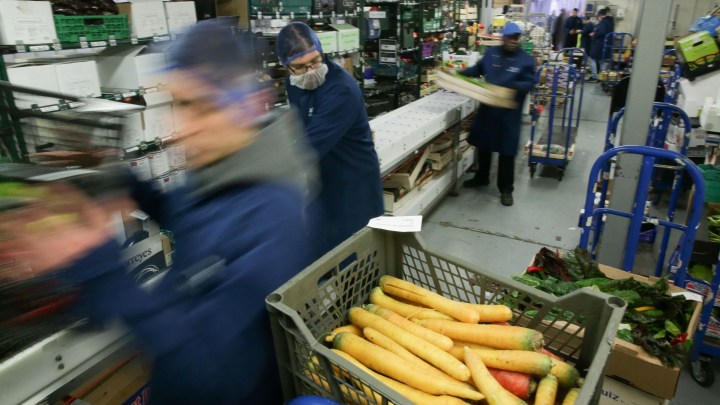
Grocers are stockpiling, but that probably won’t ease the pain of rising prices
Grocers are stockpiling, but that probably won’t ease the pain of rising prices

It’s been a long time since we experienced the great toilet paper shortage of 2020. And though consumers aren’t as worried about getting the goods they need, retailers are. With new strains on the supply chain, grocers are having a hard time keeping certain items stocked.
One of those grocers is Chuck Lawrence. He owns two supermarkets on the coast of Maine.
Every day brings new challenges for Lawrence. On Tuesday night, he had to drive 40 miles to the nearest Sam’s Club to buy stuff to resell at his store.
“I’m going four or five times a week right now,” Lawrence said.
This time it was a strawberry emergency. He found out there wouldn’t be any in his Wednesday morning delivery. Oh, and that delivery? It ended up being late. The trucking company doesn’t have enough drivers.
“We have help scheduled at 5:30 in the morning to start stocking that truck. It shows up two hours later, we’ve got two hours of lost productivity, and then we’ve gotta pick it up on the other end,” he said.
That’s wasted labor — at a higher cost. Lawrence is paying $2 an hour more than before to attract workers. Meanwhile, the price of many food items has increased. Red meat costs Lawrence twice as much as it did before the pandemic. He can’t really stock up on that and other perishables.
So, he’s stocking up on what he can, including canned foods, charcoal and bottled water.
“We’re trying to anticipate supply issues before they happen. Unfortunately, you’ll get a curveball. Like you can’t get toilet bowl cleaner right now,” he said.
And stocking up comes at a cost.
“It’s the money to rent the space. It’s the cost of the extra time moving around,” said Ken Boyer, a professor of supply chain management at Ohio State University.
Retailers hope stockpiling will limit the costs they need to pass on to customers because people are very sensitive to food price increases.
Ananth Iyer, a professor of operations management at Purdue, isn’t too concerned about supply shortages. But, he said, if the cost of labor at factories and trucking companies doesn’t go down, “somebody has to pay it. And guess who? It’s going to be the consumer at some point.”
As for Chuck Lawrence, he’s trying to hold off on raising prices. At least until he sees the national chains do it first.
There’s a lot happening in the world. Through it all, Marketplace is here for you.
You rely on Marketplace to break down the world’s events and tell you how it affects you in a fact-based, approachable way. We rely on your financial support to keep making that possible.
Your donation today powers the independent journalism that you rely on. For just $5/month, you can help sustain Marketplace so we can keep reporting on the things that matter to you.











